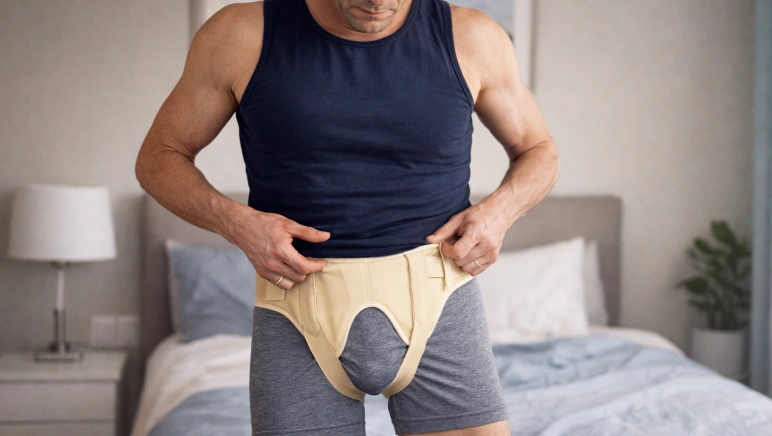.webp)
Hernias develop when tissue or an organ pushes through a weak spot in the muscle wall. Some hernias are unavoidable—caused by age, genetics, or congenital weakness—but lifestyle choices may lower your risk. Here’s what you can do to protect your abdominal wall and promote overall health.
Understanding Hernias and Risk Factors
The most common hernias include:
- Inguinal: Groin area (more common in men)
- Hiatal: Stomach bulging through the diaphragm
- Femoral: Upper thigh/groin, more common in women
- Umbilical: Near the belly button
Key risk factors: chronic strain from lifting, coughing, or constipation; obesity; smoking; prior abdominal surgery; and natural aging.
Maintain a Healthy Weight
Excess body weight increases abdominal pressure, which weakens muscles and makes hernias more likely.
Tips for weight control:
- Eat more vegetables, lean proteins, and whole grains
- Avoid overeating—try smaller portions
- Stay active with walking, swimming, or light cardio
Even modest weight loss reduces strain on your abdominal wall and lowers hernia risk.
Strengthen Your Core Muscles
A strong core provides natural support for your abdomen and spine. Targeted exercises help distribute physical stress more evenly.
Try simple moves:
- Planks – engage deep abdominal muscles
- Bridges – strengthen glutes and core
- Gentle crunches – light abdominal activation (avoid overexertion)
Always check with your doctor before starting new exercises, especially if you already have a hernia.
Use Proper Lifting Techniques
Improper lifting is one of the fastest ways to strain your abdominal wall. To protect yourself:
- Squat down to lift, don’t bend at the waist
- Keep the load close to your body
- Engage your core for support
- Ask for help with heavy objects
Good technique reduces unnecessary abdominal pressure and lowers hernia risk.
Manage Chronic Conditions
Certain health issues raise hernia risk over time:
- Chronic cough – treat allergies, asthma, or lung conditions
- Constipation – increase dietary fiber and hydration
- Prostate or urinary strain – follow up with your doctor
By addressing these conditions early, you reduce strain on your abdominal wall.
Quit Smoking
Smoking weakens connective tissue and slows healing. Quitting not only lowers hernia risk but also improves heart, lung, and overall health.
The Limits of Prevention
It’s important to remember: even the healthiest lifestyle can’t guarantee hernia prevention. Age, genetics, and prior surgeries all play a role. But adopting these habits improves your general health and may reduce severity or complications if a hernia does occur.
When to See a Doctor
If you notice a bulge in your groin or abdomen, pain while lifting, or persistent pressure, consult a specialist. Early evaluation helps prevent complications like incarceration or strangulation.
Expert Hernia Care in Walnut Creek and the East Bay
At Hernia Innovations by BASS Medical Group, we combine prevention education with advanced surgical care when needed. Whether you’re looking to reduce risk or treat an existing hernia, our surgeons are here to help.
Call us today at (925) 940-1025 or schedule online at our Walnut Creek, Brentwood, Concord, or Antioch clinics.
FAQs
Can a hernia be completely prevented?
Not always—some hernias develop due to genetics or age—but lifestyle changes can help lower risk.
Does exercise help prevent hernias?
Yes, strengthening core muscles provides extra support, but avoid heavy lifting that strains your abdomen.
Can losing weight reduce my hernia risk?
Yes. Maintaining a healthy weight decreases pressure on your abdominal wall.
Does quitting smoking make a difference?
Absolutely—smoking weakens connective tissues, raising hernia risk and slowing recovery.
Fresh Insights from Leading Hernia Specialists
Stay informed with expert blogs on hernia symptoms, treatment options, prevention strategies, and recovery tips.






.webp)
